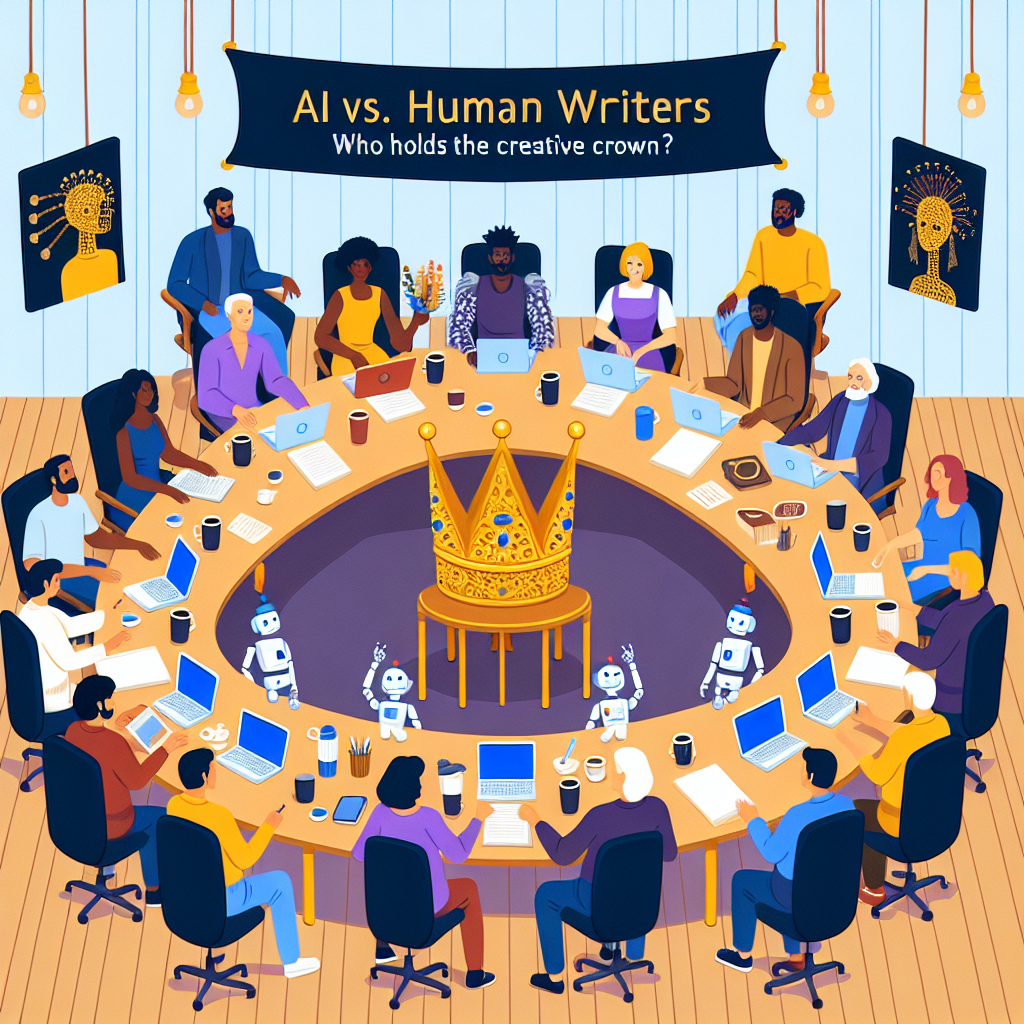In today’s world, there is a big debate about writing. Many people are curious whether artificial intelligence or human writers are the best when it comes to creativity. This article explores the battle between AI and human writers. We will look at their strengths and weaknesses, how they create content, and ultimately who holds the creative crown.
Understanding AI Writing
Artificial Intelligence is changing the way we create and consume content. Here are some key facts about AI writing:
- Speed: AI can produce a large amount of text in just a few seconds. It can analyze data quickly and generate information based on what it sees.
- Consistency: Unlike humans, AI can write consistently without losing focus. This means that it can maintain a steady tone and style throughout the text.
- Data-Driven: AI uses big data to understand trends and what topics are popular. This allows it to create content that many people are looking for.
Pros of AI Writing
- Efficiency: AI can help produce articles, blogs, and even stories in no time. Businesses can generate marketing content faster, saving time and money.
- Research: AI can gather information from different sources quickly. This makes the writing process smoother and more informed.
- Cost-Effective: Hiring a full team of writers can be expensive. AI can help fill the gaps without breaking the bank.
Cons of AI Writing
- Lack of Emotion: AI may not understand feelings and emotions the way a human does. This can make the writing feel dull or robotic.
- Creativity Limitations: While AI can mimic styles, it often lacks true creativity. Writers need imagination to create compelling stories.
- Context Confusion: AI may not understand cultural references or context. This can lead to mistakes that human writers would catch.
The Power of Human Writers
Now, let’s explore the strengths of human writers. They bring a unique touch to writing that AI cannot replicate. Here are some highlights:
- Emotional Connection: Humans can write with emotion, which helps readers connect with the content. This emotional connection is vital in storytelling.
- Creativity and Imagination: Human writers can think outside the box. They come up with original ideas and concepts that make their work stand out.
- Cultural Awareness: Writers understand cultural nuances and context. This helps create content that resonates with readers from different backgrounds.
Pros of Human Writers
- Personal Touch: Human writers have a unique voice and style that can attract readers. They can put their personality into their writing, making it special.
- Flexibility: Writers can adapt to changes in trends, styles, and preferences, allowing them to stay relevant.
- Deep Understanding: Writers can explore complex ideas and themes in ways AI might not grasp fully.
Cons of Human Writers
- Time Consuming: Writing takes time, especially for quality content. Human writers need research, drafting, and editing time.
- Emotional Drain: Writing can be tiring, especially if the subject matter is heavy. Writers can face burnout, which decreases productivity.
- Inconsistency: Human writing can vary from piece to piece. This inconsistency can affect branding and messaging.
Comparing Approaches to Writing
Now, let’s compare how AI and human writers approach their work. This can help us understand where they excel and where they fall short.
Writing Process of AI
- Data Collection: AI collects data from articles, blogs, and all sorts of written material online.
- Analysis and Patterns: It analyzes trends and patterns to create content that aligns with what readers want.
- Content Generation: AI uses algorithms to generate text based on the collected data and recognized patterns.
Writing Process of Human Writers
- Brainstorming: Humans start by brainstorming ideas and themes. This sparks creativity.
- Research and Web Exploration: Writers gather information from various sources to ensure accuracy and depth.
- Drafting and Editing: They write drafts and then revise them to improve clarity and flow. This is where the magic happens.
Real-Life Applications of AI and Human Writers
Both AI and human writers are used in different industries. Let’s look at how they are applied in various fields:
Marketing
- AI in Marketing: AI tools are used to generate ad copy, social media posts, and email content. They can analyze target audiences to find the best messaging.
- Human Writers in Marketing: Marketers rely on human writers to create stories that engage customers. Personal stories and anecdotes often resonate more than generic content.
Journalism
- AI in Journalism: News agencies use AI to write simple news articles, such as sports scores or financial summaries, quickly.
- Human Writers in Journalism: Investigative reporters dig deep into stories, uncovering truths that AI cannot. They add depth and analysis to news that engages readers.
Education
- AI in Education: AI is being used to create personalized learning materials. It can generate quizzes and instructional content based on the student’s needs.
- Human Writers in Education: Educators create lesson plans and textbooks that reflect cultural and historical contexts. They also provide mentorship that AI cannot offer.
The Future of Writing
As technology advances, the roles of AI and human writers are evolving. Here are some trends to watch for:
- Collaboration: The future may see more collaboration between AI and human writers. AI can assist with research and drafting, while humans bring creativity and emotional depth.
- Increased Demand for Quality: With so much content available online, quality will become a bigger focus again. Human writers may regain their significance in creating original and compelling narratives.
- Ethical Considerations: As AI grows, it raises questions about originality and ownership of content. The need for guidelines on AI-generated content will be crucial.
Conclusion
In the battle of AI vs human writers, both have their unique strengths and weaknesses. AI excels in speed and data-driven content, while human writers shine with emotional connection and creativity. The question of who holds the creative crown is not straightforward.
Final Thoughts
- AI is a Powerful Tool: It can significantly enhance productivity and efficiency in writing.
- Human Writers Bring Heart: The emotional depth and creativity human writers offer are irreplaceable.
- A Hybrid Future: The best approach may be a combination of both. By leveraging the strengths of AI while maintaining the unique qualities of human writing, we can create more engaging and meaningful content.
In the end, writing is an art. Whether through the lens of AI or the heart of a human writer, what truly matters is the impact the writing has on its audience. Embracing both will lead to exciting innovations in storytelling. Let’s see where this journey takes us next.
With these insights into the debate of AI vs human writers, we can appreciate the value each brings to the table. The future of writing is bright, filled with possibilities that blend technology and creativity in unexpected ways.

